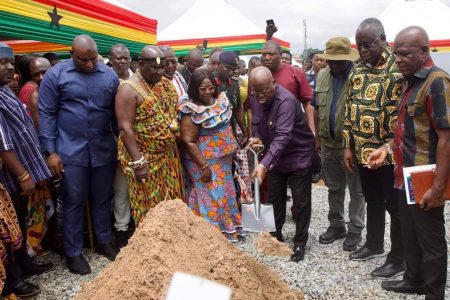President Nana Addo Dankwa Akufo-Addo has cut sod for the construction of 8,000 affordable housing units at Pokuase, near Amasaman in the Greater Accra Region.
The Pokuase Affordable Housing Project is one of the first projects under the government’s revamped National Affordable Housing Programme.
The objective is to address the affordability gap and enhance access to housing for Ghanaians.
203-acre land
The multi-dwelling housing project, a public-private partnership, will be built on a 203-acre land.
It will provide studio, one-bedroom, two-bedroom, and three-bedroom apartments.
Studio apartments to cost $13,800
The studio apartments will cover 32 square meters land and will be sold at $13,800.
1-bedroom apartments to cost $20,700
The one-bedroom apartment will be built on 48 square meters land and will be sold for $20,700.
2-bedroom apartment to cost $34, 500
Two-bedroom apartment will be built on 80 square meters land and will be sold at $34, 500.
3-bedroom apartment to cost $42,500
For three-bedroom apartment, it will cover 100 square meters land and sold for $42,500.
Amounts payable in cedis
These are amounts are payable in cedis at prevailing Bank of Ghana exchange rate.
Private developers
Five developers from both local and foreign enterprises have been chosen to build the housing units.
The private sector will source funding to build the apartments on a cost-recovery basis.
Private developers cannot sell above these agreed price ceilings but they can sell below these prices.
4,000 apartments for first phase
The first phase will consist of 4,000 apartments built in 18 months, with the remaining 4,000 units finished in the second phase within the same time.
Govt to provide land, amenities
Under the revised National Affordable Housing Programme, the government will subsidize housing units with land and infrastructure such as access roads, electricity, drainage, water, an array of sporting facilities, children play ground, swimming pool, police post, among others.
Cost subsidized by 40%
This will subsidize the cost of the building by at least 40%.
6,000 units to be built at Dedesua, Ashanti
The Pokuase project and 6,000 dwelling units on a 200-acre plot of land in Dedesua, Ashanti are the first projects under the new initiative.
Use of burnt clay bricks
The project has a high content of burnt clay bricks to be used for the perimeter fence wall, external walls of the apartments, and also for paving the walkways.
The Ministry is using this in collaboration with Brick Producers Association and Building and Road Research Institute (BRRI) to path a strategy for a sustained growth of the local building material industry.
Shuttle service
Selected bus companies such as Metro Mass among others will be engaged to operate a shuttle service for the estate to reduce the anticipated high volumes of cars, taxis and online driving services.
President Akufo-Addo said the project is testament to the governments unwavering commitment to address the pressing housing needs of workers in Ghana.
“This housing project embodies our dedication to prioritizing housing as a fundamental need of our people…Together, we are breaking down barriers and creating pathways for our citizens, regardless of their circumstance, to access homes.
“Our commitment to ensuring housing security for all Ghanaians remains resolute and we will continue to explore innovative approaches to meet the diverse needs of the Ghanaian people,” he said.
The President stated that growing urbanization constituted a significant problem to housing, widening the affordability gap and impeding the country’s implementation of effective housing policies.
He said housing has become a significant developmental concern for the country since present urban population of 58%, an urbanization rate of 3.3%, and a housing deficit of 1.8 million units.
60% require state-facilitated assistance to access housing
President Akufo-Addo pointed out that while only five per cent of the population could get homes without assistance, 60% of Ghanaians required state-facilitated assistance to access housing.
They require assistance in the form of supportive subsidies and policies, in addition to competitively priced mortgages.
35% can’t obtain housing
He contended that even with government subsidies, the remaining 35% of the population will be unable to obtain housing.
The President stated that the government initiated the revised National Affordable Housing Programme to create a favourable climate that lowers the risk associated with affordable housing and raises private sector involvement in the sector.
According to him, the framework aims to improve the ecology of housing delivery in the country by addressing both the supply and demand sides of the housing market.
President Akufo-Addo said the objective is to increase the production of affordable housing units and establish a reliable and sustainable demand side of the housing market that would be accessible to all Ghanaians
He described the project as a fruitful partnership between the government and the private sector.
According to him, the agreement also demonstrated the government’s commitment to forging stronger collaborations that will result in practical results for the people.
Subsidized mortgages
Minister for Works and Housing, Francis Asenso-Boakye said the government, through the National Homeownership Fund under the Ministry of Finance, will provide subsidized mortgages for some of the completed housing units.
Trade Unions agree to buy the houses
He announced that the Ministry of Works and Housing, along with the developers have extensively engaged the various Trade Unions, who have agreed to purchase the housing units to ensure a steady demand for the housing units, which will contribute to the overall success of the programme.
Seamless integration with neighbouring communities
According to him, well-thought-out master plan has been developed to ensure a seamless integration of the project with the neighbouring communities, fostering harmonious coexistence for their collective benefit.
The aim, he said is to create a model community that embraces eco-friendliness, supports local industries, and adapts to the challenges posed by climate change.
Asenso-Boakye said unlike other public housing projects that have ended up being purchased by only the rich, stringent mechanisms have been put in place to ensure that the target group of this project, which is the low to middle income earners are reached.
He explained that these mechanisms include income-based eligibility criteria, no resale policy, and a cap on housing units per person.
- GMA furious over suspension of duty waiver on vehicles - 3 April 2025
- Thursday, April 3, 2025 Newspaper Headlines - 3 April 2025
- Trump slaps tariffs: Ghana, UK-10%, EU-20%, others-50% - 2 April 2025

